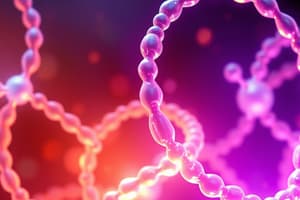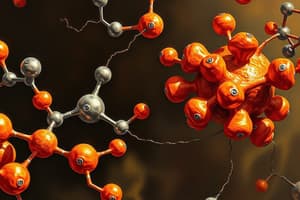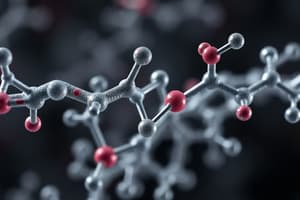Podcast
Questions and Answers
Which field of study focuses on the interrelationships among organisms and their surroundings?
Which field of study focuses on the interrelationships among organisms and their surroundings?
- Physiology
- Microbiology
- Ecology (correct)
- Zoology
The maintenance of a stable internal environment in an organism is best described as
The maintenance of a stable internal environment in an organism is best described as
- Adaptation
- Decomposition
- Homeostasis (correct)
- Circulation
Which of the following includes the study of fungi, bacteria, and viruses?
Which of the following includes the study of fungi, bacteria, and viruses?
- Microbiology (correct)
- Zoology
- Physiology
- Botany
The study of how plant structures, physiology, and genetics interact is known as:
The study of how plant structures, physiology, and genetics interact is known as:
Which of these options would be included within the field of zoology?
Which of these options would be included within the field of zoology?
Which of the following is NOT a primary area of study within the field of biology?
Which of the following is NOT a primary area of study within the field of biology?
Which macromolecule is responsible for storing and transmitting genetic information?
Which macromolecule is responsible for storing and transmitting genetic information?
What is the primary difference between prokaryotic and eukaryotic cells?
What is the primary difference between prokaryotic and eukaryotic cells?
Which cellular process is directly responsible for converting light energy into chemical energy?
Which cellular process is directly responsible for converting light energy into chemical energy?
What mechanism is considered a key driver of evolutionary change?
What mechanism is considered a key driver of evolutionary change?
Flashcards
What is biology?
What is biology?
The study of life and living organisms, encompassing their structure, function, growth, origin, evolution, and distribution. It also investigates interactions between organisms and their environment.
What are biological macromolecules?
What are biological macromolecules?
Four major classes of large, complex molecules essential for life: carbohydrates, lipids, proteins, and nucleic acids.
What is a cell?
What is a cell?
The basic, fundamental unit of life, responsible for carrying out all living functions.
What is evolution?
What is evolution?
Signup and view all the flashcards
What is genetics?
What is genetics?
Signup and view all the flashcards
Ecology
Ecology
Signup and view all the flashcards
Ecosystem
Ecosystem
Signup and view all the flashcards
Physiology
Physiology
Signup and view all the flashcards
Microbiology
Microbiology
Signup and view all the flashcards
Botany
Botany
Signup and view all the flashcards
Study Notes
Introduction to Biology
- Biology is the study of life and living organisms, encompassing their structure, function, growth, origin, evolution, and distribution.
- It seeks to understand the interactions between organisms and their environment.
- Broad areas of study within biology include:
- Cell biology
- Genetics
- Ecology
- Evolution
- Physiology
- Microbiology
- Botany
- Zoology
- The scientific method is crucial for biological research and discovery.
Biological Molecules
- Four major classes of biological macromolecules are essential for life:
- Carbohydrates: Provide energy and structural support. Examples include sugars (glucose, fructose) and starches.
- Lipids: Store energy, form cell membranes, and act as hormones. Fatty acids, phospholipids, and steroids are examples.
- Proteins: Perform diverse functions, including catalyzing reactions (enzymes), transporting molecules, and providing structural support. Amino acids are the building blocks.
- Nucleic acids: Store and transmit genetic information. DNA and RNA are the primary examples.
Cells
- The cell is the basic unit of life.
- Prokaryotic cells lack a nucleus and membrane-bound organelles. Bacteria are an example.
- Eukaryotic cells have a nucleus and membrane-bound organelles, enabling compartmentalization of functions. Animal and plant cells are examples.
- Cellular processes include:
- Respiration: Breakdown of molecules to release energy.
- Photosynthesis: Conversion of light energy into chemical energy.
- Mitosis: Cell division for growth and repair.
- Meiosis: Cell division for sexual reproduction.
Genetics
- Genetics is the study of heredity and variation in organisms.
- DNA is the molecule that carries genetic information.
- Genes are segments of DNA that code for specific proteins.
- Inheritance patterns are determined by the principles of Mendelian genetics.
- Genetic mutations can lead to variations and sometimes diseases.
- Modern genetics includes areas like:
- Genomics
- Proteomics
- Bioinformatics
Evolution
- Evolution is the change in heritable characteristics of biological populations over successive generations.
- Natural selection is a key mechanism of evolution, favoring traits that enhance survival and reproduction.
- Evidence for evolution includes the fossil record, comparative anatomy, and molecular biology.
- Adaptation is the process by which organisms become better suited to their environments through evolutionary changes.
Ecology
- Ecology is the study of the relationships between organisms and their environment.
- Key ecological concepts include:
- Ecosystems: Communities of organisms interacting with their physical environment.
- Populations: Groups of individuals of the same species interacting in a particular area.
- Communities: Assemblages of different populations interacting in an area.
- Biomes: Large-scale ecosystems characterized by specific climate and vegetation.
- Biodiversity: The variety of life on Earth at all levels, from genes to ecosystems.
Physiology
- Physiology investigates the functions of organisms and their parts.
- Examples include:
- Biological processes in different organ systems: digestive, respiratory, circulatory
- Body’s response to internal and external stimuli.
- Hormonal regulation and neurotransmission.
- Homeostasis: Maintaining a stable internal environment.
Microbiology
- Microbiology is the study of microscopic organisms, including:
- Bacteria
- Viruses
- Fungi
- Protists
- Includes their structure, function, and interactions with other organisms.
- Microorganisms are important in diverse processes, including:
- Decomposition and nutrient cycling
- Industrial applications (fermentation)
- Disease causation and treatment
Botany
- Botany is the study of plants.
- It encompasses various aspects of plant life, including morphology, physiology, genetics, evolution, and ecology.
- Plant diversity and organization is a key subject.
Zoology
- Zoology is the study of animals.
- It includes the study of animal diversity, anatomy, physiology, behavior, evolution, and ecology.
- Different approaches, including comparative anatomy and behavioral studies.
Studying That Suits You
Use AI to generate personalized quizzes and flashcards to suit your learning preferences.





